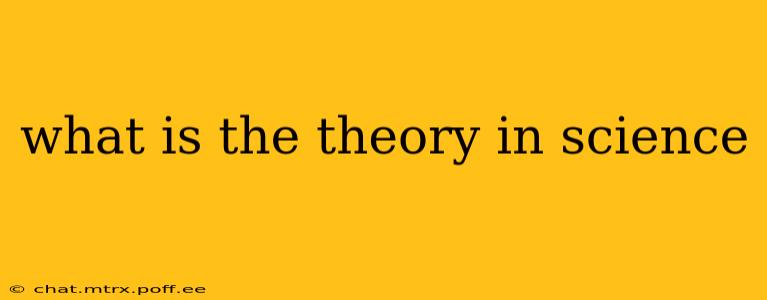What is a Theory in Science? Unraveling the Misconceptions
The word "theory" in everyday conversation often implies a guess or a hunch. However, in science, a theory holds a vastly different and far more significant meaning. It represents a well-substantiated explanation of some aspect of the natural world, based on a vast body of evidence and rigorous testing. Understanding this distinction is crucial to grasping the power and reliability of scientific theories.
What Makes a Scientific Theory Different From a Hypothesis or a Law?
Many confuse theories with hypotheses or scientific laws. Let's clarify these differences:
-
Hypothesis: A hypothesis is a testable prediction or explanation made on the basis of limited evidence as a starting point for further investigation. It's a tentative explanation, a proposed answer to a scientific question. Think of it as an educated guess.
-
Theory: A theory, on the other hand, is a well-established explanation supported by a substantial amount of evidence gathered over time. It's not a single experiment but a culmination of many experiments, observations, and analyses. Theories explain why things happen.
-
Scientific Law: A scientific law describes what happens under certain conditions. It's a concise statement, often mathematical, that summarizes a consistently observed phenomenon. Laws don't explain why the phenomenon occurs; that's the role of a theory.
For example, Newton's Law of Universal Gravitation describes the force of attraction between objects with mass. However, Einstein's Theory of General Relativity provides a more comprehensive explanation of gravity, incorporating concepts like spacetime curvature. The law describes the what, while the theory explains the why.
How Are Scientific Theories Developed and Tested?
The scientific method forms the backbone of theory development. It involves:
- Observation: Identifying a phenomenon or problem.
- Hypothesis formulation: Proposing a testable explanation.
- Experimentation: Designing and conducting experiments to test the hypothesis.
- Data analysis: Analyzing the results to determine if the hypothesis is supported.
- Theory construction: If a hypothesis is repeatedly supported by evidence, it may contribute to the development or refinement of a theory.
- Peer review and publication: Sharing findings with the scientific community for scrutiny and validation.
Theories are not static; they are constantly refined and even replaced as new evidence emerges. This process of continuous refinement is a hallmark of scientific progress.
What are some examples of well-established scientific theories?
Many robust and well-tested theories underpin our understanding of the universe:
-
The Theory of Evolution by Natural Selection: Explains the diversity of life on Earth through the mechanisms of natural selection, mutation, and genetic drift.
-
The Theory of Relativity: Explains gravity as a curvature of spacetime and revolutionized our understanding of the universe at both large and small scales.
-
The Big Bang Theory: The prevailing cosmological model for the universe, explaining its origin and evolution from an extremely hot, dense state.
-
Germ Theory of Disease: Explains that many diseases are caused by microorganisms.
Aren't Scientific Theories Just "Unproven"?
The notion that scientific theories are "unproven" is a common misconception. The term "proven" in the scientific context doesn't mean absolute certainty. Scientific theories are supported by a substantial amount of evidence and have withstood rigorous testing. They are considered the best explanations currently available, based on the available evidence. However, they remain open to revision or replacement in light of new findings.
Are there limitations to scientific theories?
Yes, scientific theories are always subject to the limitations of the current available data and technology. They can be refined or replaced if new evidence contradicts existing explanations. The strength of a scientific theory lies in its ability to adapt and evolve with new information.
